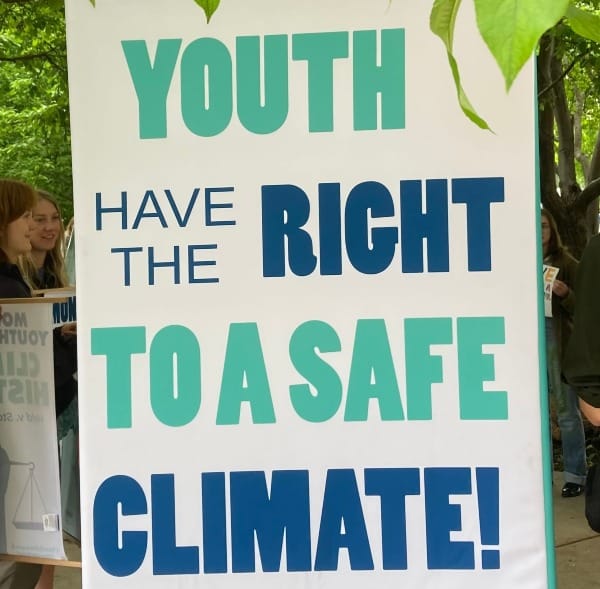Dutch Court Set To Rule In Appeal Of Landmark Climate Court Case Verdict Against Shell

The Hague Court of Appeal in the Netherlands will issue its much-anticipated decision this week in the landmark climate case Miliuedefensie et al. v. Shell, which saw climate campaigners win a historic verdict against the oil major in May 2021 that Shell has since appealed. The appeals court’s ruling on November 12 will mark a critical and decisive moment in corporate climate accountability litigation, one that will either further validate the legal responsibility of polluting companies like Shell to comply with the Paris Agreement’s global climate targets and with human rights law, or reverse (either partially or fully) the 2021 verdict holding an oil major accountable to emissions reduction obligations for the first time.
“This is an important moment for everyone who is seriously concerned about climate change, but it is especially important for young people, because it is also about our future,” Winnie Oussoren, chairwoman of Milieudefensie Jong (Milieudefensie’s youth division), said in a press statement. We hardly have a voice in politics and are not as powerful as the big polluters, such as Shell. But in court, we can make a difference based on the facts and show that there is hope to stop the climate crisis.”
Milieudefensie along with several other environmental organizations initiated this pioneering legal action against Shell in 2018, and with the support of more than 17,000 citizens, the NGOs filed their lawsuit in 2019 seeking to compel the Netherlands-based oil company (formerly known as Royal Dutch Shell) to align its business activities with the Paris Agreement goals for limiting global temperature rise. The case was grounded in the Dutch “duty of care” legal principle and in international human rights law, and built upon the historic Urgenda climate case against the Dutch government.
In May 2021 the Hague District Court ruled that Shell is a significant contributor to the climate crisis and has a legal duty to do its fair share to mitigate this harm under Dutch law. The court ordered Shell to reduce its entire supply chain emissions by 45% by 2030. This was the first time anywhere in the world that a court had imposed an emissions reduction obligation on a polluting company, and it was seen as a huge breakthrough in attempts to hold Big Oil accountable for its outsized role in driving the climate crisis. The court decided that, although climate change is a global problem that cannot be solved by any one party, Shell has a responsibility to do its part to prevent climate damage and to respect human rights, and that these obligations outweigh Shell’s commercial interests.
Shell then appealed the district court’s ruling, which remains binding during the appeal process. But Shell’s actions and business strategy announcements over the last few years suggests that the company may be defying the court order. “Instead of reducing emissions, Shell has been growing,” Milieudefensie’s Nine de Pater said during a media briefing last week. She noted that Shell has plans to increase its oil and gas development, with more than 800 new fields yet to be exploited. The company has already approved 20 new oil and gas projects since the 2021 court decision, according to an analysis published earlier this year by Milieudefensie and Oil Change International. The organizations say that “any expansion of oil and gas goes against the court order.”
Furthermore, Shell has scaled back its previous climate commitments, and its investment in renewable energy like wind and solar has declined (from 8% of its capital spending in 2022 to 6.5% in 2023). Rather than absolute emissions reductions, Shell has set targets to reduce its carbon intensity, meaning that its overall emissions could still increase even as its portfolio becomes slightly less carbon intensive. Shell has no reduction target for 95% of its CO2 emissions, Milieudefensie’s head of research Sjoukje van Oosterhout said during the media briefing. “Shell said in court that its emissions will not be lower in 2030 and may actually increase,” she told reporters. Since the district court verdict, Shell has also relocated its headquarters from the Netherlands to the UK and dropped “Royal Dutch” from its name. But the relocation has no bearing on the case, van Oosterhout said, since Shell was headquartered in the Netherlands when the case began.
The Court of Appeal held hearings over four days in April this year. Shell argued that it cannot be held legally responsible under the Paris Agreement, that a court cannot order it to reduce emissions (separation of powers argument), and that it should not be held accountable for emissions from products it sells (Scope 3 emissions). Milieudefensie countered these arguments and highlighted that Shell is a significant contributor to climate change and must be held responsible. “We tried to really highlight the influence of the fossil fuel industry in obstructing climate policy,” van Oosterhout said. She added that while climate science was not a substantive part of the appeal hearings, Milieudefensie did provide the court a brief overview of the latest science, which supports the NGO’s position in this case.
According to a recent post on Milieudefensie’s website, the questions that the appeals court’s decision will address include:
1) is Shell a contributor to dangerous climate change?
2) is Shell putting human lives at risk?
3) can Shell be held responsible for its Scope 3 emissions?
4) does Shell have a duty to reduce its Scope 3 emissions, and if so, by how much?
Heading into Tuesday’s delivery of the verdict, Milieudefensie says it is preparing for all potential outcomes but is “confidently looking forward” to the ruling.
“Of course we are considering every scenario, because it is now up to the judges to make a judgement in this case. At the same time, the facts cannot be ignored: Big polluters like Shell emit large amounts of greenhouse gases and it is in everyone's interest that they drastically reduce their emissions,” Roger Cox, a lawyer for Miliuedefensie, said in a press statement.
“The factual basis has only become stronger in recent years,” added Donald Pols, director of Miliuedefensie. “Plus, we also see that the climate crisis has increased in intensity. Floods, wildfires, heat records, and other climate disasters dominate the news.”
Whichever way the appeals court rules, the decision is likely to be taken to the Dutch Supreme Court. This final appeal process, called cassation, will only consider whether the appeals court’s decision was reasonable. According to Milieudefensie, Shell has already stated it intends to turn to the Supreme Court if the appeal court’s verdict is not in their favor.
When asked if there is a risk that Shell could further delay implementing the district court order to reduce its emissions 45% by 2030 while a final appeal plays out, Pols said it will be up to the court but that Shell does not have the option to ignore a court-imposed obligation.
“It will be determined by the court judgment when the verdict needs to be implemented,” Pols said during the November 6 media briefing. “But in the first instance, the court judgment had to be implemented immediately, so going into appeal did not provide the space to Shell to not implement it, and our expectation is that will be the same with the cassation.”
Pols also told reporters that the concern of the US re-election of Donald Trump weakening the Paris Agreement (the US is expected to once again exit the global climate accord) should have no impact on the case against Shell. But he acknowledged the considerable influence of polluters and petrostates in stymying global climate action. “This is part of a global transition in which the laggards representing fossil fuel interests and corporate interests are using everything within their power to resist the transition to a clean economy,” Pols said.
“Large companies, large polluters like Shell basically state that we are outside of the democratic framework that has been agreed upon by all the countries,” he added. “By saying they cannot be held accountable based on international agreements, they place themselves outside of the democratic rule of law. That is what we want to achieve with our court case, is that everybody in society should implement agreements that have been made by the global community, including large polluters like Shell.”
The Hague Court of Appeal will issue its decision on November 12 at 8am CET.


